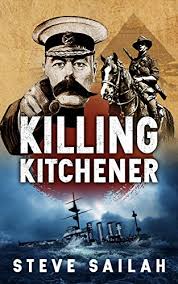Vance Gainsborough*
‘Review note: Steve Sailah’s Killing Kitchener is a nicely-paced yarn set against a historical background’, Honest History, 1 September 2018
My (self-published) novelist friend, Ned Rowney, advises me that the keys to a good yarn are Place, Plot and People. Former ABC journalist, Steve Sailah, had some success a few years ago with his first novel, A Fatal Tide, which was set on Gallipoli. ‘Amid Gallipoli’s slaughter, he hunted a murderer …’, the blurb began. Who could resist that teaser?
In Sailah’s Killing Kitchener, Place shifts from Gallipoli to Cairo, Sinai, Scapa Flow and the Orkneys, and London, with flashbacks to the Veldt during the Boer War. There is some nice atmospheric writing here and there, salted with the occasional cliché about dill Pommy officers and disrespectful Australians.
 The Plot is, well, about killing Field Marshal Horatio Herbert Kitchener, 1st Earl Kitchener, His Majesty’s Secretary of State for War, plus some earlier unresolved matters. We cannot say too much more without giving the game away. Readers of A Fatal Tide will be at an advantage, but the Kitchener angle is new and nicely handled, with an air of mystery sustained from the Prologue on HMS Hampshire in June 1916 till well into the book.
The Plot is, well, about killing Field Marshal Horatio Herbert Kitchener, 1st Earl Kitchener, His Majesty’s Secretary of State for War, plus some earlier unresolved matters. We cannot say too much more without giving the game away. Readers of A Fatal Tide will be at an advantage, but the Kitchener angle is new and nicely handled, with an air of mystery sustained from the Prologue on HMS Hampshire in June 1916 till well into the book.
The People are, apart from Kitchener, Harry Chauvel, Arthur Conan Doyle, AP Herbert, Lawrence of Arabia, and Banjo Paterson, to name a few, and, of course, our hero, Thomas Clare, and his pals Snow and Lulu. Charles Bean, Emily Hobhouse and ‘Breaker’ Morant lurk. The villains (none of those previously listed) are exotic types indeed. Lulu (a knockabout former circus clown) is another exotic, perhaps unnecessarily so. Indigenous Snow suffers from the prejudices of the day. Clare is sketched only, but characterisation is not really the aim of the book.
Clare and his pals speak in stilted tones, redolent of Enid Blyton’s Famous Five or Mary Grant Bruce’s Billabong books. This is the book’s major weakness, falling under the heading (an added P) of Plausibility, where I would also place the youthfulness of Clare – teenage NCOs were not thick on the ground early in the Great War, even if their uncle was General Chauvel – and the age gap between Thomas and his female lover, although their brief relationship certainly adds to the Pace (further P) of the story.
Pace is Killing Kitchener’s great strength – one has to concentrate hard to keep up with the rapidly-wrought twists and turns after the initial scene-setting – along with Preparation – Sailah has read lots of history books and, for the most part, does not let his knowledge swamp the story.
For a final P, there are a couple of Production issues (chapter titles missing, inconsistency in the right hand justify) but these can be overlooked with a nod to the courage of the self-publishing novelist. Ned Rowney knows all about that.
* Vance Gainsborough is a pseudonym. He has written for Honest History on a couple of Canberra exhibitions (on pets and puffery), Meanjin, and Meanjin and Tocsin. The also pseudonymous Ned Rowney is the author of South Coast Roast, a detective novel.


Leave a Reply
You must be logged in to post a comment.